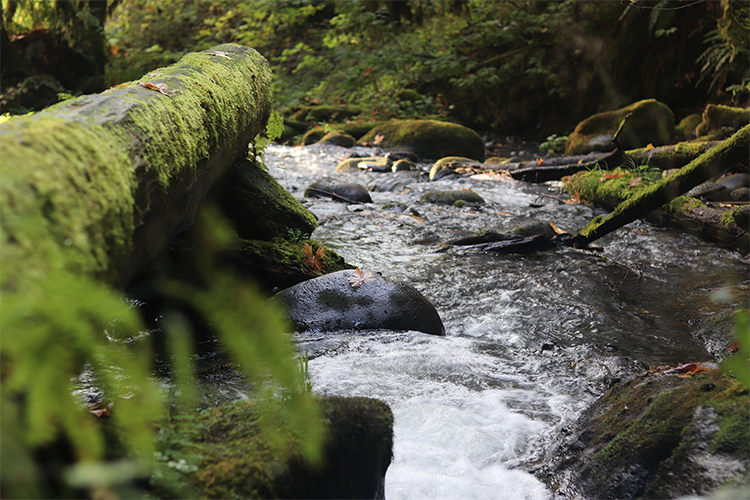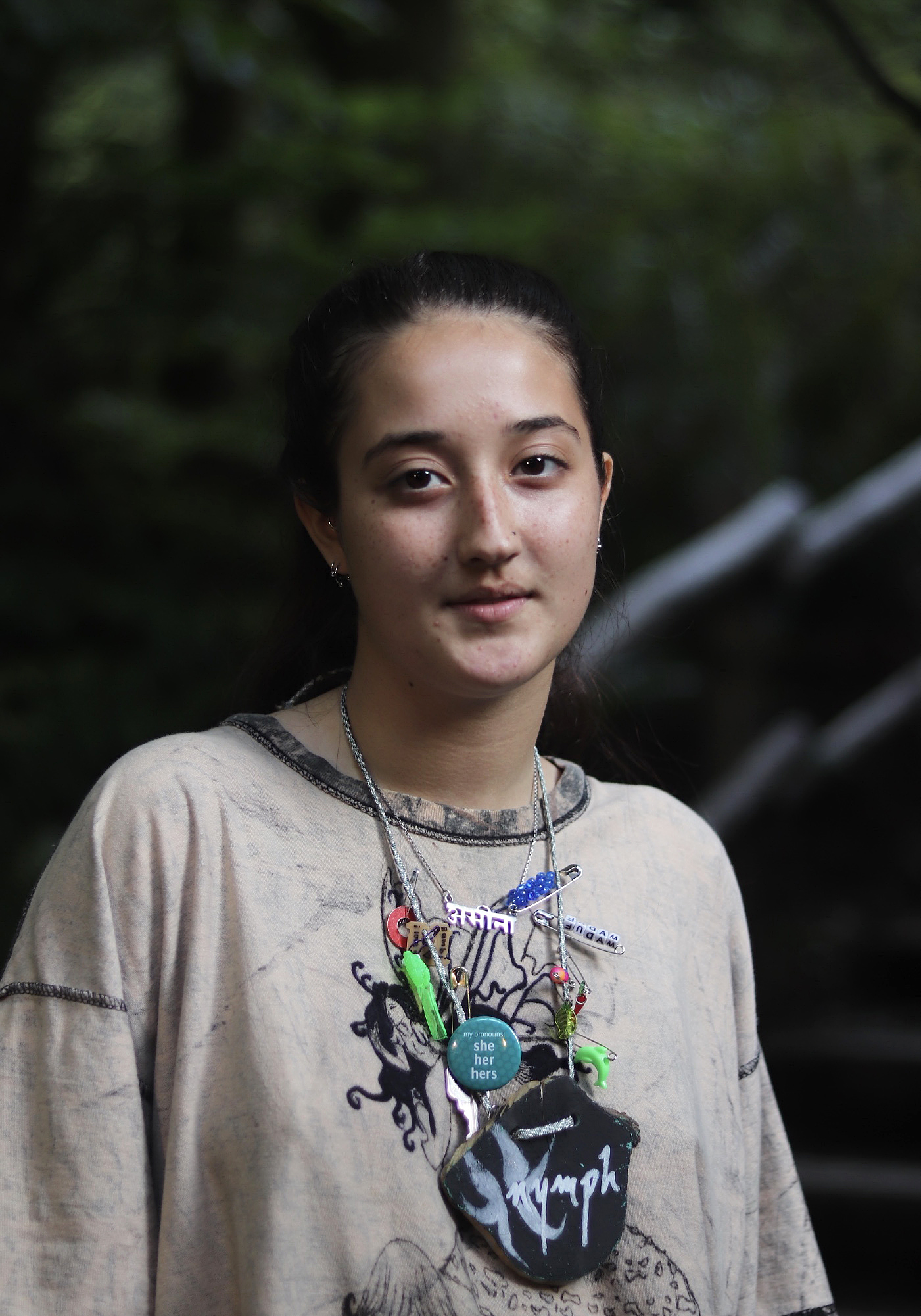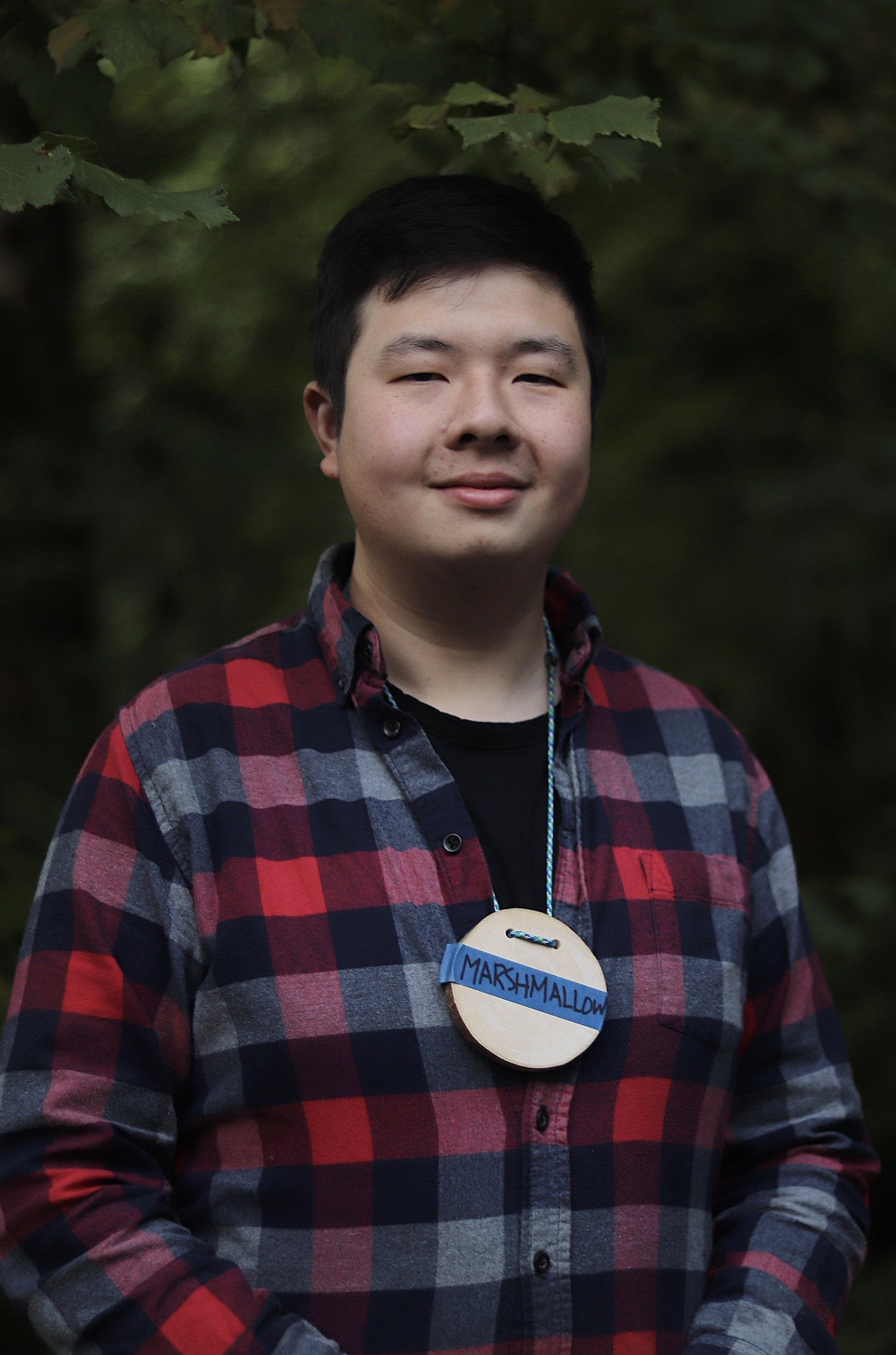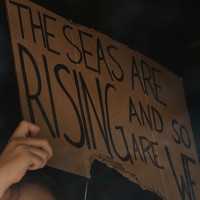
“Kaleidoscope, what is a watershed?”
I am walking through the forest, sunlight beaming through the trees on a crisp autumn day, with a gaggle of sixth graders behind me asking questions about dissolved oxygen, pH and watersheds. I answer with a simple, “Let’s find out,” as the sixth graders encircle me in a sheltered spot on the banks of the Sandy River.
They giggle while we build in the sand.
“Remember, we need to build a farm, a forest, a city and a factory.”
The students finish building, and I grab the fluorescein dye that represents pollution. Together, we decide how much “pollution” is produced by each of the four elements they built. We pour the water from the watering can and watch it trickle down the river they carved in the sand, picking up “pollution” as the stream builds.
“Wow! It’s green!” a few students shout in excitement. “That’s gross, that’s so much pollution,” others say. This sets me up perfectly to talk about how pollution contaminates waterways. The students then shout out ideas about how they can reduce pollution in their everyday lives as we walk to our next station.
Outdoor School (ODS) is a place where summer camp and school collide. It provides a hands-on learning environment and offers opportunities in ways that schools often do not. One of the goals of ODS is to help students understand that they have a voice, both in the classroom and outside of it.
ODS operates six sites, with field instructors (FIs), who lead the scholastic instruction, program leaders (PLs), who help in the cabin and do pretty much everything else and student leaders (SLs) who live in cabins with sixth graders and teach field study. SLs are high school students from the Portland-Metro area who volunteer a week of their time.
Getting to teach outside and in a hands-on environment is an incredible experience for staff, SLs and sixth graders alike. ODS provides an opportunity for students to learn in a highly participatory and interactive learning environment. This educational style, as well as a strong support system provided by staff and SLs, encourages and uplifts student voices.
ODS is unparalleled for a multitude of reasons. One of the purposes of ODS is to educate sixth graders about the human impact on the environment. Each day, one SL takes a group of four to seven sixth graders and teaches them various activities. This allows for support and accommodation for everyone’s learning style, and for interactions to be personalized and individualized.
The small groups offer specialized attention to students’ needs, which makes difficult and broad topics more emotionally and scientifically accessible. SLs are better able to say all that they want to say, lead more hands on activities and talk about more challenging topics such as climate change.
SLs are also taught to address individualized student needs. If there is a student who, for example, doesn’t like to share or speak in front of groups of people, SLs are encouraged to institute a tactic called “Think, Pair, Share” so that everyone’s voice is heard.
This community, built on validation, is a great tool for youth empowerment, as it shows them that they deserve respect, regardless of their backgrounds.

“I think it is definitely something special to learn from someone who is not 10-plus years older than you,” says Audrey “Nymph” Lacey, a Lincoln student and five-time SL on water field study.
High school students like Nymph are desired by ODS because they are viewed as a “cool” older person and have authority over middle schoolers. However, they are not as threatening or intimidating as an adult. The smaller age gap allows for a more personal connection between students and SLs.
Getting to teach in the natural, wooded environment is one of the keystone aspects of ODS. Teaching water field study, I get to test the dissolved oxygen of the Sandy River, talk about the impact humans are having on bodies of water, all while sitting on a river bank.
After SLs establish a basic understanding of climate change, we try to remove the sense of hopelessness kids and teens often feel when talking about it. While Joshua “Jaws” Anklam was the FI at Namanu ODS, he ran specific activities regarding climate change. “During my field study with the watershed activity, we talked about … how major pollutants in cities are fossil fuels coming from vehicles and companies and factories and how they’re going into the air and how that’s impacting our ozone layer and making our planet a little bit more susceptible to the changes of the climate to such, to varying levels of extremities,” says Jaws.
Jaws says he tries “to use my space to provide a space for everyone to just be able to talk about how they were feeling and talk about issues that were very special to them.” This gives students a safe place to ask questions and hold space for their emotions, which aids them in feeling less hopeless and confused, and also empowers them through education.
ODS teaches sixth graders from all sorts of home lives, educational backgrounds and otherwise widely-varied situations. “I think a lot of the times with younger kids from elementary all the way up to high school it can get a little difficult trying to figure out who you are, and what your voice is,” says Jaws. “And at times it can feel like you don’t really have your voice or people won’t let you use your voice.”
Part of an educational goal at ODS is showing kids how to advocate for themselves and others by setting high schoolers up in role-model positions. “Education really provides the experience and the, just the knowledge to really shape who a person will be and what they can do, and really help them realize the power that they have in their hands,” says Jaws.
This empowerment of student voices is an integral part of ODS and what SLs, FIs and PLs try to accomplish with sixth graders in the week we get to spend with them.
The Multnomah Education Service District runs ODS. In the mission statement they have published about ODS, they say one of their goals is to “promote self-esteem, leadership and confidence in sixth grade and high school students.”
By empowering students we are helping pave the way for change. Sixth graders do not remember everything we teach them, but what I always hope the students remember is the confidence they felt when they learned they had power in the fight against climate change.
Uplifting students is what will make change in this world. Unfortunately, not every kid believes they have the power to make change, and some don’t even understand that they have a voice. ODS provides a place for kids to learn that they have a voice and that they have power. “Being given the care and positive attention that the SLs and staff provide can really help instill kids with strength, to be themselves, and to come out of their shells,” says Max “Polar” Linssen, a Grant senior and ten-time SL on animals and soil field study.
Giving sixth graders the knowledge that their voice has power is something both staff and SLs try to do. Teaching kids that their voice matters, even on international topics and issues like climate change, is an exceptionally valuable life lesson.
“One of the things I would talk about in my outros was just talk to anyone you can see about climate change. Even dogs or cows or cats, just talk about it, and people will listen,” Jaws says.
After the sixth graders build a watershed, we discuss the small ways sixth graders can help slow the impacts of climate change at home; a lot of them realize they can walk to school, take shorter showers or simply just talk about it.
“People are really ignorant and uneducated about climate change and about the ways we treat the environment and the impact that we have,” says Nymph. “And I think Outdoor School is really great because at least now… a lot of what we talk about is how we impact our waterways and how that adds to global warming.”

ODS has done a lot of work over the decades to meet science standards and successfully teach about current events. “Our curriculum was developed in the 1960s and through the 70s, and so that’s the mold that Multnomah Outdoor School has been following for a really long time,” says Doug “Marshmallow” Sam, the current FI at Namanu. “And I think that it’s really important for us to recognize that it’s no longer the 1960s or 70s or even the 2000s and when I was going through Outdoor School, and present our students with timely issues that make them think, that make them feel concerned, also hope, and to get them to understand … that’s not just enough now to learn about water, soils and plants, we have to connect those things to what is happening right, right now.”
Andrea “Coho” Hussey is the Program Supervisor and has been involved with ODS since 1988, when she attended Howard ODS as a sixth grader. She works on training staff and developing curriculum, among other things. “We [ODS] have a partnership with METRO … our partnership there is to help kids learn about their impact, right, their carbon footprint, water waste and conservation, and paper towels,” Coho says.
Activities that explain the effects of climate change, such as ocean acidification, in combination with the endorsement of youth voices creates an incredibly powerful experience for sixth graders and high schoolers alike. Traditional education systems tend not to do this, which makes ODS stand out.
“We want kids to have a positive experience in the outdoors so they want to take care of it,” says Coho. “And I think if kids are doing that, and our curriculum supports kids and values them as learners, and values their perspective, and their ways of knowing, and helps them become critical scientists, then that will help support action towards making changes with the climate change.”
Coho experienced many ODS traditions that are still going strong at all the sites. One of these traditions plays a small part in helping the earth.
At the end of every ODS week, we plant a tree. Every field study is represented; the tree is from plants field study, we use soil sixth graders brough from a special place all mixed together to represent soil field study, we use water from the Sandy River for water field study, and an insect or arthropod is released over the planted tree to represent animals field study.
ODS is all about education, conservation and empowerment. After we plant this tree, we recite a stanza written by Baba Dioum in 1968: “In the end we will conserve only what we love; we will love only what we understand; and we will understand only what we are taught.”


Awesome article! Thanks for sharing it!